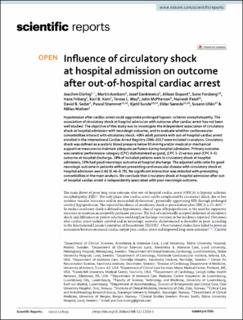Influence of circulatory shock at hospital admission on outcome after out-of-hospital cardiac arrest
Düring, Joachim; Annborn, Martin; Dankiewicz, Josef; Dupont, Allison; Forsberg, Sune; Friberg, Hans; Kern, Karl B.; May, Teresa L.; McPherson, John; Patel, Nainesh; Seder, David B.; Stammet, Pascal; Sunde, Kjetil; Søreide, Eldar; Ullén, Susann; Nielsen, Niklas
Journal article, Peer reviewed
Published version

Åpne
Permanent lenke
https://hdl.handle.net/11250/3021761Utgivelsesdato
2022Metadata
Vis full innførselSamlinger
- Department of Clinical Medicine [2064]
- Registrations from Cristin [9742]
Sammendrag
Hypotension after cardiac arrest could aggravate prolonged hypoxic ischemic encephalopathy. The association of circulatory shock at hospital admission with outcome after cardiac arrest has not been well studied. The objective of this study was to investigate the independent association of circulatory shock at hospital admission with neurologic outcome, and to evaluate whether cardiovascular comorbidities interact with circulatory shock. 4004 adult patients with out-of-hospital cardiac arrest enrolled in the International Cardiac Arrest Registry 2006–2017 were included in analysis. Circulatory shock was defined as a systolic blood pressure below 90 mmHg and/or medical or mechanical supportive measures to maintain adequate perfusion during hospital admission. Primary outcome was cerebral performance category (CPC) dichotomized as good, (CPC 1–2) versus poor (CPC 3–5) outcome at hospital discharge. 38% of included patients were in circulatory shock at hospital admission, 32% had good neurologic outcome at hospital discharge. The adjusted odds ratio for good neurologic outcome in patients without preexisting cardiovascular disease with circulatory shock at hospital admission was 0.60 [0.46–0.79]. No significant interaction was detected with preexisting comorbidities in the main analysis. We conclude that circulatory shock at hospital admission after out-of-hospital cardiac arrest is independently associated with poor neurologic outcome.
